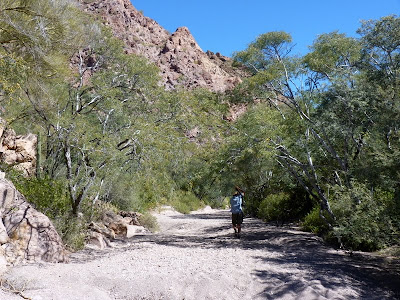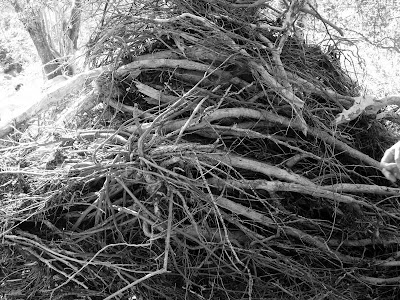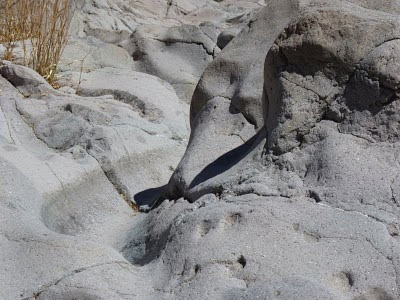2 March 2010
Ballandra Cove
Trying to capture the folds of the mountains, but the boat swings around too quickly for me to finish the sketch. Oh well, a sense of the fold is there, the spiny cordillera.
It's a beautiful morning: cool, clear, wisps of cloud reach across the sky. I am feeling well in my body, relaxed after our six hour walk up and back along the stony path carved by the arroyo through the mountains. We'd aimed for Salinas, but stopped short at the last range crossing the island. There the stream bed had become narrow and steep and strewn with boulders; water, when it ran, had etched a canyon into the range. We'd not started early enough to keep going and still make it back, and we were hot and a bit tired--the sun in our faces the whole way back.
In that other world in there, in the mountains back of the sea, there are flowering plants, birds, lizards, even long abandoned waterholes and ranching projects. And clinging to everything, the heady purple scent of flowers in bloom. Even in the middle of the night, beneath the full moon, when we got up to haul the dinghy, to stop it from banging against the hull as we rocked in the swell, the scent was still there, billowing out from the land and perfuming the cove.
Today the bees send out messengers to investigate us: they are looking for water but sip remnants of yoghurt; they cling to the rims of our breakfast dishes, buzzing, wings aflutter.
The water is clear and light green today, each ripple reflects the red rock of the mountains, so the whole looks like a weaving of red and green strands glittering in the sunlight. Wind catches the flag and slaps the halyards against the mast; we turn to the north, nose into the wind.
Emotions wash over me out here when we are afloat--yesterday, for example, we spoke about my poor dead wolf dog Binky, and then I found myself weeping, missing her, feeling sad for all of the times I'd misunderstood her. I think often of my grandmother too. It seems strange to do so, to remember the orderly stones bordering her garden, the rows the petunias, the passion flower--a single vine--she trained up the side of the house. Everything so genteel, so well-ordered, at times, so ersatz-- at all like this wild environment where nature (sun, desert, dust, heat, sea, wind, creeping vines) overtakes signs of culture within weeks and months, breaking apart most human endeavours, rendering them transient, decomposng their order almost immediately. Why here, then, do I think of her?
Why do I carry a sense of her with me like a comfort, a guardian angel? Perhaps because she, of all of my nearest ancestors--grandfather, father and mother--was not a worrier, but had an adventuresome soul. A weak heart, but little or no paranoia.
Perhaps I hold her to me here as the ancestor best to travel with, the one who would let me be, and not plague me with too much fearfulness. Those others, they're installed in my body, in my shortness of breath, in my nausea and mild seasickness, in the anxiety that grips we when we're away from the boat: what if it's drifted off of its anchor; what if we encounter an uncharted rock; what if something we don't know how to fix breaks down? These are the worries that make me leap up in the middle of the night to look around or to stow the breakables as we rock gently side to side in the swell.
Nothing really moves at such moments: the bowls and cups are all stuck fast with inertia. But I move perhaps so I will not be, and pay the price with anxiety, with fear.
How to find the balance between these emotions, these bodily sensations, that's the struggle, every day. Most days, that's nothing more than a very rough sketch. If that.
Viejo sol, por favor | Please, Old Sun
-
He aquí una revisión de uno de los primeros poemas que intenté escribir en
español hace unos años. Hoy hace suficiente calor como para arreglarlo y
publica...



































